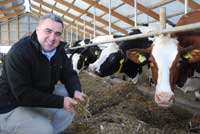
Transition Cow Health Expert Shares Research and Management Tips
??

Dairy producers should change their expectations for transition dairy cow performance and not accept these animals as a high health risk, but rather an opportunity for high milk production, good health and optimal fertility, according to Tom Overton, Ph.D., professor of dairy management and director of the PRO-DAIRY Program at Cornell University. Dr. Overton maintains that achieving all three benefits can be a realistic expectation for transition cows.
Addressing nutritionists, veterinarians and dairy producers at this fall's World Dairy Expo, Dr. Overton said transition period goals should include high milk production and a low incidence of metabolic disorders around the time of calving. Achieving these objectives, he said, requires properly managing energy metabolism, blood calcium and immune function of transition cows.
According to Dr. Overton, key components of transition cow nutrition programs should include:
- Tight control of macrominerals in cow diets as they approach calving.
- Control of energy intakes both in far-off and close-up groups.
- Excellent feed management to ensure accurate ration implementation and prevention of TMR sorting.
- Focus on ration fermentability during the fresh period.
Protecting immune function
Subclinical hypocalcemia (SCH), or low blood calcium without symptoms of clinical milk fever, during the transition period contributes to impaired immune function, delayed reproduction and other metabolic disorders. Dr. Overton emphasized the need for real-time blood monitoring at the herd and cow level using physiological markers and technology. He also described a negative dietary cation-anion difference (DCAD) diet fed to prepartum cows as one of the most effective strategies to help reduce the risk of both clinical milk fever and SCH, which in turn may lead to improved immune function.
?Dr. Overton's research has demonstrated the success of an aggressive DCAD strategy with the use of anionic supplementation. This feeding strategy has been shown to increase post-calving blood calcium, feed intakes and milk production. Dr. Overton recommends feeding a negative DCAD diet prepartum, fully acidified to a urine pH between 5.5 and 6.0, with 180 grams of calcium.
"We have learned and implemented a lot in the last 10 to 15 years, but there is more opportunity to improve transition cow success," Dr. Overton said. "This includes managing hypocalcemia, controlling energy intake precalving, proper feed management and managing the non-nutritional factors."
Dr. Overton's presentation at World Dairy Expo was sponsored by Phibro Animal Health Corporation, which offers two nutritional specialty products that help promote transition cow health: Animate®, a palatable source of supplemental anions that may help reduce the risk of hypocalcemia when fed as part of a negative DCAD prepartum diet, while also maintaining dry matter intake; and OmniGen-AF®, which helps support normal dairy cow immune function in the face of expected and unexpected stress events year-round.
Dr. Overton is recognized nationally and internationally for his research and extension efforts relating to metabolism, immune function and nutritional physiology of the transition cow. He has authored or coauthored more than 70 peer-reviewed scientific publications and numerous technical articles for conference proceedings, extension publications and popular press articles.
 About Phibro Animal Health Corporation
About Phibro Animal Health CorporationPhibro Animal Health Corporation is a diversified global developer, manufacturer and marketer of a broad range of animal health and mineral nutrition products for use in the production of poultry, swine, cattle, dairy and aquaculture. For more information, visit pahc.com.
10.22.2015